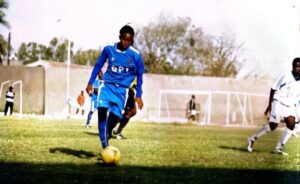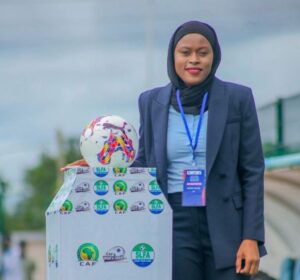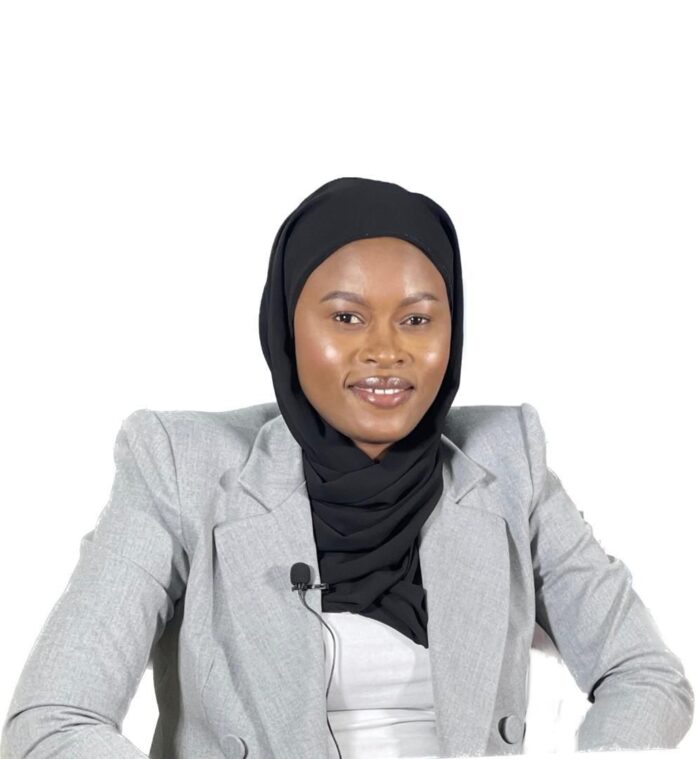By: Muhammed Lamin Drammeh
In the sun-drenched streets of Abuko, The Gambia, a young Veronic Aisha Malack chased a football with a defiance that would define her life. Surrounded by brothers and sisters, she kicked up dust on makeshift pitches, and her passion for the game undeterred by a society that saw football as a man’s domain. Today, as the Women’s Football Development Manager at WAFU Zone A and the first Gambian to earn the prestigious FIFA Master in Management, Law, and Humanities of Sport, Malack is no longer playing the game , she’s leading it as an administrator for women across West Africa. Her journey from a determined girl to a global trailblazer is a result of her resilience, vision, and the power of dreaming big.
A Girl with a Ball and a Dream
Malack’s love for football began in Abuko, where she grew up in a family of Guinea-Bissauan descent. “I started playing football as a young girl in the streets,” she recalls. “Football was known as a male sport, so my parents, family, and friends didn’t understand why I chose to play.” The lack of moral support stung, particularly from her mother, who feared societal judgment. “She was scared of the comments, that I’d look like a man or couldn’t bear children due to the physical transformation from training,” Malack says. Friends, too, were unsupportive, labeling her with a “bad identity.” Yet, Malack’s belief in herself was unshakable. “I was healthy, popular, and confident because of the sport,” she says. “I knew my future was bright.”
The challenges were not just personal. Women’s football in The Gambia faced systemic barriers: not much national team competitions, limited publicity in their matches after grueling training camps, and a lack of funding, infrastructure, and media coverage. Religious and cultural stereotypes further cemented the notion that football was for men. Undaunted, Malack joined Eastern Lions, then known as Abuko United Female Team, where she quickly made her mark. As captain and top scorer with eight goals, she led the team to a second-division title and promotion to the Gambia Football Federation ’s First Division, winning the league in 2007 and 2008. Later, she played for Interior Women’s FC (now Police FC) from 2012 to 2016, representing every national team category except the U-20s.
 Veronic Aisha Malack in action for Gambia Police FC, where she played from 2012 to 2016 before transitioning into football administration.
Veronic Aisha Malack in action for Gambia Police FC, where she played from 2012 to 2016 before transitioning into football administration.
Her proudest moment came on the global stage, representing The Gambia at the FIFA Women’s U-17 World Cup. “It was a transformative journey,” she says, reflecting on her first international trip as team captain at the Norway Cup U-15 and U-16 tournaments through GIFT Gambia Academy. “Wearing the national jersey, being seen as a role model in my community, and gaining media exposure with international televisions, it was a great pride and honor.” These experiences solidified her identity as a trailblazer, inspiring young girls in Abuko and beyond.
Balancing the Pitch and the Classroom
Malack’s ambition extended beyond the pitch. A self-described ‘academically excellent’ student, she excelled in school despite juggling football, athletics, volleyball, and extracurricular activities. “It was very difficult during my junior and secondary school days,” she admits. Yet, her drive to prove that football could be a profession, on and off the field, pushed her to pursue a bachelor’s degree at the University of The Gambia. Inspired by Martin Gomez, a former GFF executive member who saw her potential, Malack sought to fill the gap in educated women leaders in Gambian sports. “I wanted to serve as a role model, especially to parents, to show that girls can play football and succeed,” she says.
Her academic pinnacle came in 2022, when she became the first Gambian to earn the FIFA Master, a rigorous program across De Montfort University (UK), SDA Bocconi School (Italy), and a law module in Neuchâtel, Switzerland. The experience was transformative. “As a young Gambian woman, visiting some of the world’s most influential sports organizations and learning how they operate was a unique privilege,” she says. A personal highlight was writing a paper on the carbon footprint of the UEFA Champions League and Women’s Champions League, which challenged her to think critically about sports’ global impact. “I was overwhelmed to realize my dreams had been achieved,” she reflects.
The FIFA Master shaped her holistic approach to decision-making, deepened her understanding of the global sports landscape, and honed skills like strategic planning and adaptability. It also built a global network, equipping her to lead with confidence in a male-dominated industry.
From Player to Powerhouse: Leading at WAFU Zone A
Malack’s transition from player to administrator marked a new chapter in her mission to advance women’s football. After serving as Assistant Women’s Football Coordinator at the GFF, where she worked under Technical Director Sang J. Ndong and Assistant Ebrahim Nyassi , she now heads the Women’s Football Department at WAFU Zone A, overseeing nine member associations: The Gambia, Cape Verde, Guinea, Guinea-Bissau, Liberia, Mali, Mauritania, Senegal, and Sierra Leone.
Her role is expansive: organizing competitions, developing women’s football strategies, empowering female referees and administrators, and nurturing young talent through initiatives like the CAF Pan School Football Programme, Women’s Senior Cup, U-17 and U-20 Championships, and CAF Prize Money Project. “These initiatives align with my vision to encourage young girls to start playing competitive football from the grassroots level,” she says. By fostering collaboration, monitoring projects, and advocating for school-based programs, Malack is shaping the future of women’s football across West Africa.
Reflecting on her GFF tenure, Malack describes it as “amazing but full of obstacles.” Travel opportunities and networking were highlights, but communication challenges and the male-dominated environment tested her resilience. “The GFF sharpened my administrative career,” she says, crediting it for paving the way to her FIFA Master. Her WAFU role, however, offers a broader platform. “Life is a ladder—you move from one step to another,” she says. “At GFF, I focused on The Gambia. Now, I design and implement programs for nine countries, exploring global opportunities and building career security.”
The Evolution of Women’s Football in The Gambia
When Malack began playing, women’s football in The Gambia was nascent, with its first national team game in 2007. Today, the landscape has transformed. “The national first and second divisions, as well as regional leagues, have improved significantly and are very competitive,” she says. International player transfers, increased media coverage, and more women in coaching, refereeing, and administration signal progress. Investors are taking notice, drawn by the success of teams like Berewuleng , who are preparing for the 2025 WAFU Zone A Championship.
Yet, challenges persist. Funding, infrastructure, and societal attitudes remain barriers. “Stereotypes that football is for men, religious factors, and lack of representation still hold us back,” Malack notes. For young female footballers, she emphasizes opportunities like leadership training, professional leagues, sponsorships, and national team participation. “These build self-esteem and open doors,” she says, drawing from her own journey as a role model.
Breaking Barriers, Building Opportunities
As a woman in a male-dominated field, Malack has faced formidable challenges. “Navigating professional change, dealing with difficult colleagues, and managing stress were tough,” she says. Language barriers, working with Portuguese and French-speaking colleagues at WAFU, and family pressures added complexity. Yet, her self-belief and focus propelled her forward. “I knew what I wanted,” she says, echoing the determination that carried her from Abuko’s streets to international boardrooms.
Her mission now is to create opportunities for others. Through advocacy, partnerships with schools and communities, and WAFU competitions, she aims to develop talent and empower women in leadership and governance. “The future is bright for Gambian women in football,” she says. She plans to lead by example, sharing her wisdom through a future sports consultancy firm focused on strategic planning, risk management, and event management.
A Vision for the Future
Malack’s ultimate vision is bold: a thriving women’s football ecosystem in The Gambia and WAFU Zone A, led by capable women decision-makers. She envisions well-equipped clubs, national budgets that prioritize women’s sports, and partnerships with NGOs to attract sponsors. “I want to ensure women and girls’ rights are upheld, with equal pay and fairness,” she says. By engaging stakeholders like the Ministry of Youth and Sports, she aims to embed women’s football in national development plans, fostering inclusivity and visibility.
To young girls dreaming of sports or other male-dominated fields, Malack’s message is clear: “Focus on building skills, maintaining a healthy lifestyle, and advancing your education. Set goals, foster a positive mindset, and believe in yourself. Acting like a man doesn’t make you a good baller, perseverance and mental strength do.”

A Legacy in Motion
From the dusty pitches of Abuko to the global stage of WAFU Zone A, Veronic Aisha Malack has carved a path where none existed. As a player, she broke barriers; as a scholar, she redefined possibilities; as an administrator, she’s building a future where every Gambian girl can chase her dreams. Her journey is a beacon of hope, proving that with passion, resilience, and vision, one woman can change the game. “What men can do, women can do better,” Malack once said. And she’s proving it, one kick at a time.




